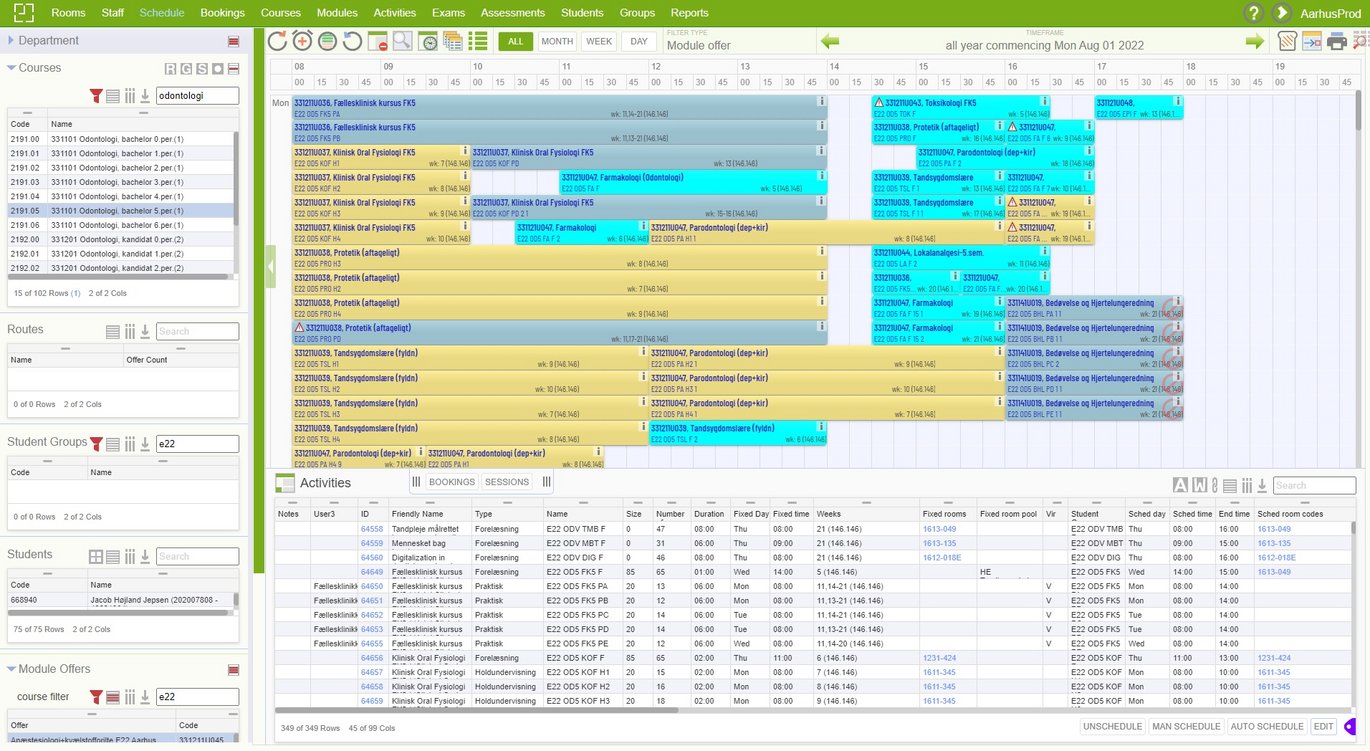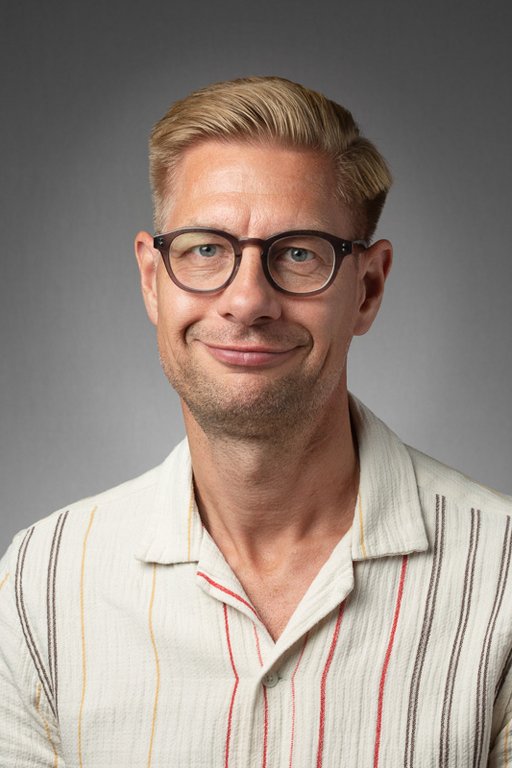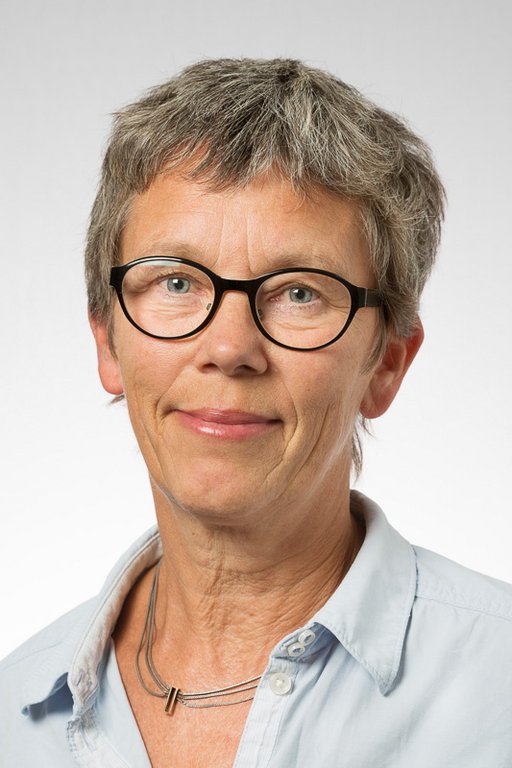The academic year is now being placed in a new, common annual schedule
Over the past two years, Aarhus University has been rolling out its new planning tool for teaching. From this year on, all departments must plan their teaching well in advance, in accordance with a joint annual schedule in PLAN.


It’s a bit of a jigsaw puzzle to get classes, rooms and teaching scheduled for Aarhus University’s 38,000 students. Over the past couple of years, the university has therefore been transitioning to the common PLAN system. Now it is Health’s turn to plan the year in accordance with a joint annual schedule – an exercise which may seem easier on paper than in reality, says Head of Studies Administration Mads Hedelund.
“We have to distribute a huge number of teaching staff, classes and students between rooms across the entire campus. At Health, we also have the extra challenge that part of the teaching must take place in rooms that are designed for special purposes, such as clinics, rooms with special hygiene requirements, etc. So we need to juggle a lot back and forth to get all the courses to fit.”
The PLAN planning system has already been implemented across most of the university and the departments at Health. What is new is that from this spring onwards, everyone must register their lesson plans earlier than usual, especially with regard to the spring semester, says Mads Hedelund.
“Formerly, many of Health’s spring courses were only planned after the summer holidays, because most of the teaching staff like to have the teaching and examinations over and done with before they start planning the next phase. But with the new annual schedule, they will have to start already in June, and the plans must be ready for publication by October.”
An earlier response may be a good thing for logistics planning, but according to Kirsten Beedholm, Director of Studies at the Department of Public Health, it is not without its own problems.
“My concern is that the annual schedule, contrary to the intention, will have an impeding effect on the development of study programmes. With the new annual schedule, we will be planning next year’s teaching while the teachers are still in the process of completing the same courses. That means that we will not be able to take the course evaluations into account. So it will be difficult to find the time and energy to innovate. We thus risk the teachers reporting the same as the year before,” she says.
Mads Hedelund understands the concern, but does not think that the annual schedule will have a braking effect on development.
“What is to be reported to the HE studies administration is more the ‘hard data’, such as for example whether the teaching is a seminar or a lecture, and how many course sessions there are in all. So it will still be possible to develop the teaching, change the academic content or move subject elements between the teaching sessions after the teachers have reported on the HE studies,” he explains.

Good for the students – and resources
It can be difficult to sign up for a course if you don’t know when and how the teaching is planned to take place. For this reason, it is very much for the students’ sake that the planning is now being placed in an annual schedule, so that the classes, rooms and plans are fully in place before course registration and the semester start. And even though the new annual schedule requires early preparatory work by the teachers, it will hopefully also give a plus on the resource side,” says Mads Hedelund.
“I’m well aware that this is a bit skewed in relation to the normal procedures for some, but I believe that it will also release more time for both good research and teaching. In the current situation, a lot of time is spent searching for empty rooms and adapting a course of teaching after others have been laid down.”
Health is also introducing the academic quarter-hour, so that the teaching can be planned according to the same time frames as the rest of the university. This makes room distribution a somewhat easier task than previously.
“When we’re all in the same timeframe, it will be easier to gain an overview of which rooms are available. This might for example mean that we can book fewer teaching hours at late hours, because we can distribute the rooms better,” says Mads Hedelund.
He does not expect many students to come from the other faculties, as Health has many rooms which are subject-specific, but Health students may find that they have to go more around the University Park when they have lectures.
MSc in medicine gets an extra year on freewheel
There is an exception to every rule – and there are also some who will be allowed to wait a little longer before they have to jump into the annual schedule and PLAN. This applies, for example, to the Master’s degree programme in medicine. Much of the teaching in this subject is done under the auspices of the Region, and planning has therefore traditionally taken place in a system that is independent of the rest of Health and AU. For this reason, it will be the autumn of 2024 before the Master’s programme will have to be included in the annual schedule and be subject to the PLAN system.
Programmes that are currently in the process of developing new curricula will also be given a slightly longer leash. The Master’s programme in odontology and the Professional Bachelor programme in dental hygiene and clinical dental technology will thus not be incorporated into the joint annual schedule until the curricula are fully in place.
ABOUT
- All teaching planning at Aarhus University is to be transferred to PLAN
- The transition to PLAN began in the autumn of 2020
- The annual schedule applies to all five faculties
- The Master’s degree programme in medicine has until 2024 to organise the teaching in PLAN and according to the annual schedule
- The Master’s degree programme in odontology and Professional Bachelor’s degree programmes in dental hygiene and clinical dental technology are awaiting new curricula
CONTACT
Training Manager - Health Studies Administration
Mads Hedelund
Phone: 93522580
Email: mhed@au.dk